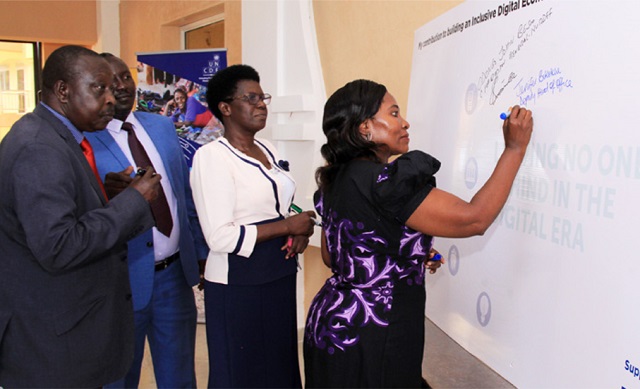
It is targeting one million people in key economy sectors
Kampala, Uganda | JULIUS BUSINGE | Small and medium businesses in northern Uganda now have a big opportunity to exploit from a Shs57bn new project that aims to use information technology tools to offer services for the next five years.
Dubbed ‘leaving no one behind in the digital era’ a United Nations agency – the UN Capital Development Fund (UNCDF) is implementing the project, which it unveiled in Arua town on March 19.
The most outstanding idea in this project is the provision of market tools for access to information and markets by organized individuals running businesses. It will also provide access to digital devices like mobile/ smart phones.
The project targets business and organized groups in sectors of finance, energy, agriculture, health and education.
Jenifer Bukokhe Wakhugu, the deputy head of office at UNCDF, said the project is designed to build an inclusive digital economy in Uganda with a specific focus on empowering rural communities – smallholder farmers, women, youth, medium and small businesses and refugees – to lead productive and healthy lives, by expanding access to and usage of digital services.
“It is a catalytic intervention,” she said, “We hope the government will takeover in the future and rollout the services.”
The initial pilot of this program targets refugee settlements and host communities in the North and West Nile regions of Uganda.
By the end of the project, its designers believe that it will contribute much in achieving the UN designed sustainable development goals and general improvement in service delivery in the targeted sectors.
“We want to see products of farmers reaching markets and offered good prices,” Bukokhe said.
To achieve all this, she said, they are partnering with private sector players including telecom firms and information technology companies to develop and scale digital solutions for communities that are often marginalized and not accessing digital innovation and technologies due to social norms, societal status, and limited revenue and capacity.
UNCDF data indicates that the Ugandan digital financial market has grown from 26% in 2014 to roughly 56% in 2019.
However, the agency says that, in rural communities such as the Northern and West Nile Regions of Uganda where the project would be implemented, access to mobile digital financial services lags behind at levels of less than 30%.
She said that the telecoms will work to improve the network where it is weak but also help in designing and hosting online apps and providing affordable and user friendly mobile phones to all targeted individuals.
“Users should be able to even transact in local languages,” she said.
Private sector partners
Emmanuel Mensah, the monitoring and evaluation officer at one of the partnering private sector companies, MobiPay Agrosys Limited, said they are positive about the project and are ready to play their part.
He said they have formed a network of digital community entrepreneurs (lead farmers) which will help to increase last mile distribution of digital inclusion related services and products such as phones, off-grid energy solutions, bank accounts, farming inputs, and electronic airtime.
He told The Independent that through this partnership, they will impart financial and digital literacy skills to beneficiaries using the trained community entrepreneurs.
Mensha said by the end of February this year, they had profiled 126, 000 farmers and 76 producer organizations.
“We will use our platform to connect farmers to processors and buyers…and to disseminate extension information,” he said.
Ronald Rwakigumba, UNCDF’s consultant on inclusive digital financial services, told The Independent that the need for telecom services in West Nile and Northern Uganda is high and that the two main firms (MTN and Airtel) have promised to invest more in the region.
“They need to do infrastructure improvements in some parts of Northern Uganda so that no one is left behind as implementation of the project gains momentum,” he said.
He said the business model they are deploying will ensure that the milestones that will have been achieved will serve as a foundation to spearhead growth in the targeted sectors.
The impetus
UNCDF officials said they are well positioned to help develop inclusive digital economies because of their experience and success in previous digital finance initiatives, dating back to 2004.
Focused primarily on the poorest, hardest to reach users, officials said, these interventions have given their team members unique experience in accelerating digital finance usage in key markets and in scaling up impactful services to new users.
Digital adoption in emerging markets is not a case of replicating the ‘build it and they will come’ strategy of Silicon Valley but a nuanced process of understanding the markets, the constraints of affordability and literacy, and the role of agents and on-theground teams in adoption efforts,” Bukokhe said.
She said that interventions in Uganda feed into key emerging global sector issues. For instance, she said that, the past two decades have seen a phenomenal change in the adoption of mobile and digital technology in emerging markets.
As a result, the sector predicts that the number of unique mobile subscribers will reach 5.9 billion by 2025, equivalent to 71% of the world’s population; yet, a more significant opportunity lies in mobile internet reaching 61% of the population in the same period.
Globally, the growing ubiquity of mobile phones has led many people to use them as their primary means to access a wide range of services.
However, common barriers such as cost, literacy and availability have prevented users from progressing beyond basic services such as calling and messaging, which is why ‘leaving no one behind’ programme is important.
(This week’s THE INDEPENDENT #CoronaVirus Special Edition is online-only and available to all our readers. Read the other articles in the magazine here –click) 
*******
info@independent.co.ug
 The Independent Uganda: You get the Truth we Pay the Price
The Independent Uganda: You get the Truth we Pay the Price





